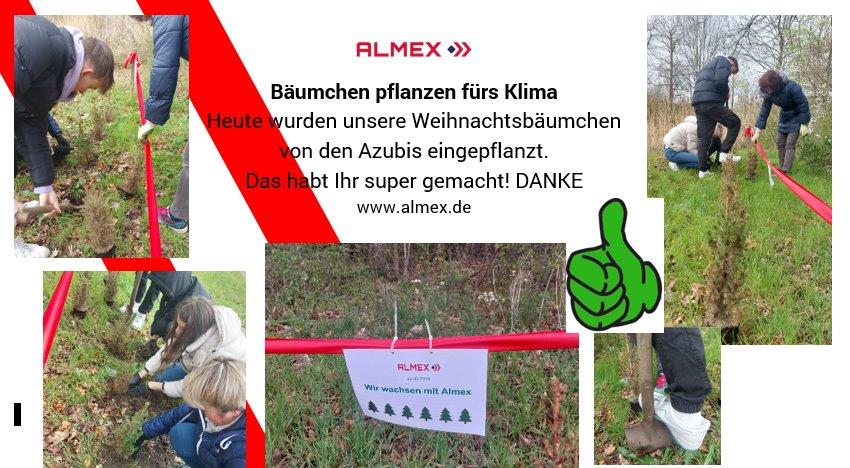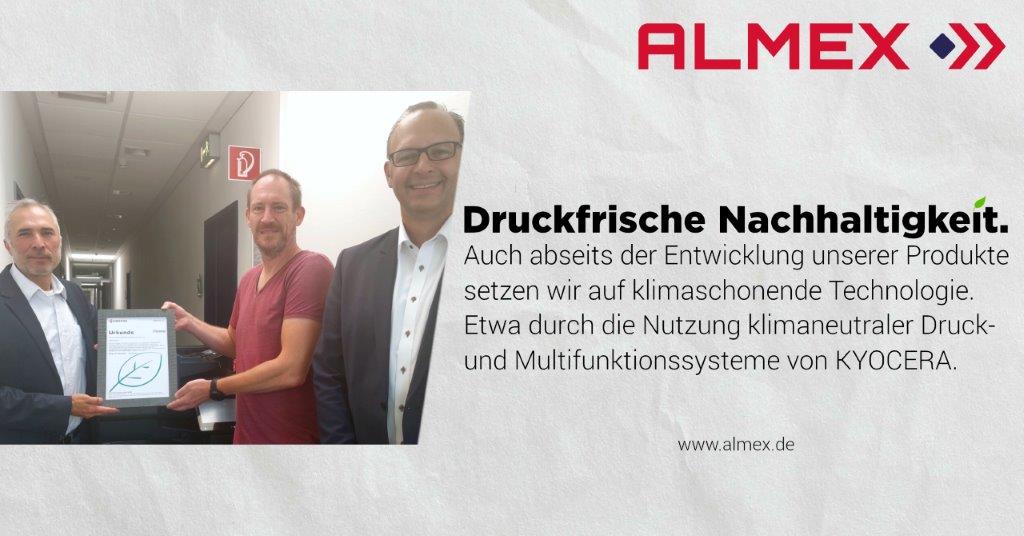Environment and sustainability
Sustainability, environmental protection and energy saving are more than ever key issues in the responsible use of resources. At ALMEX, too, these are some of the key factors in our thinking and daily actions.
As a modern company with the Public Transport, Retail & Logistics and Digitalization divisions, Almex GmbH makes a contribution to this.
With its product portfolio, ALMEX effectively supports public transportation, which plays a central role in shaping the future in an environmentally friendly way.
The cashless ticket vending machine series eliminates the need for cash management, and the current generation of cashless vending machines offers savings in terms of materials, energy, transportation and maintenance.
Our scalable vending systems and solutions for merchandise management and transport logistics rely on the use of reusable modules and energy-saving components. In this way, we also offer customers resource-saving tools and equipment.
Furthermore, our products have a long service life as they are developed and manufactured to high industry standards, even when used in harsh working conditions, which also meets customer requirements.
Active environmental management leads to changes within the company itself, whether through savings in energy consumption or by changing the awareness of employees. For example, old packaging from incoming goods is reused in shipping, motion detectors are used for lighting in certain areas to save energy, attention is paid to precise waste separation, electric charging stations are installed in the employee parking lot – and drinking water is provided for employees in water dispensers instead of in individual bottles.
Process improvements and products
- Use of reusable modules in development
- Use of energy-saving components
- Development of resource-saving systems and products
- Longevity of products through high quality standards
In the company
- Installation of e-charging stations in the car park
- Saving energy by using motion detectors in areas that are used less frequently
- Strict waste separation
- Replacement of conventional lamps with LED lamps
- Reuse of old packaging from incoming goods for shipment
- Avoiding waste by using drinking water dispensers instead of individual bottles
- Change from plastic packaging filling material to crumpled paper and cardboard
Reporting, ratings and rankings
Our sustainability efforts are an ongoing process that requires continuous improvement processes and annual reporting.
Through our membership of the United Nations Global Compact (UNGC) Network Germany e.V., we regularly publish our CoP (Communications on Progress) along the ten principles in the areas of human rights, labor, environment and anti-corruption.
Our sustainability performance is assessed and tracked by the rating and ranking agency EcoVadis.
This performance assessment helps us to measure our sustainability activities and provides a comparison with other companies in our sector and beyond.
Sustainability along our value chain
Our corporate governance is characterized by a sense of responsibility, legally compliant practices and long-term value creation.
To this end, the Executive Board and management levels cooperate in terms of a risk and compliance process and ensure transparent reporting. We also take responsibility for our supply chain and fulfill our due diligence obligations.
Responsible corporate governance
With our declaration of principles, we have committed ourselves to strengthening human and environmental rights, preventing and avoiding their violation, minimizing them and taking remedial action if necessary.
Our whistleblower portal is used to identify compliance violations. Employees can use this whistleblower platform to report information anonymously.
Our employees can use it on the intranet.
Guidelines for sustainable procurement
As a globally active company, we ensure environmental and social standards in the supply chain. We implement our due diligence obligations on the basis of clearly defined processes and in close cooperation with our suppliers. The key principles can be found in our Supplier Code of Conduct and in our Sustainable Procurement Policy.
The sustainability standards for our value chain are documented in our Supplier Code of Conduct, which was last updated in May 2024. It contains minimum requirements for compliance with internationally defined human rights, which are based on the fundamental principles of the Universal Declaration of Human Rights and corresponding UN documents. It also formulates expectations regarding climate and environmental protection. Based on the German Supply Chain Due Diligence Act (LkSG), we audit our suppliers regularly and on an ad hoc basis.
As part of the LkSG, a complaints portal is available for anonymous reports from employees, business partners and other third parties via a neutral reporting office.
CERTIFICATIONS
We act in accordance with the applicable guidelines and standards and demonstrate transparency regarding environmental and social aspects. This includes information on environmental, social and employee issues as well as respect for human rights and the fight against corruption and bribery.
ISO 14001
EcoVadis: We have been a certified member since 2013
Global Compact: We have been a member since 2021
Our sustainability management in the areas of marketing, strategy, sales, controlling, logistics and human resources reflects our social responsibility.
Reduction of the footprint by 50
At ALMEX, we always strive to develop innovative solutions that not only improve the efficiency of business processes, but also have a positive impact on the environment.
Storeganizer’s 3D system has enabled us to reduce the space required in our previous small parts warehouse by 50% – while maintaining the same capacity. This change not only opens up new opportunities for us to optimize our logistics processes, but also makes a significant contribution to our sustainability efforts. By reducing the space required, we not only reduce the consumption of resources such as space and energy, but also minimize our CO2 emissions, as less storage space means less need for building materials for the expansion of storage areas and less transport costs for goods. In this way, we are making an important contribution to protecting the environment and conserving our natural resources.


